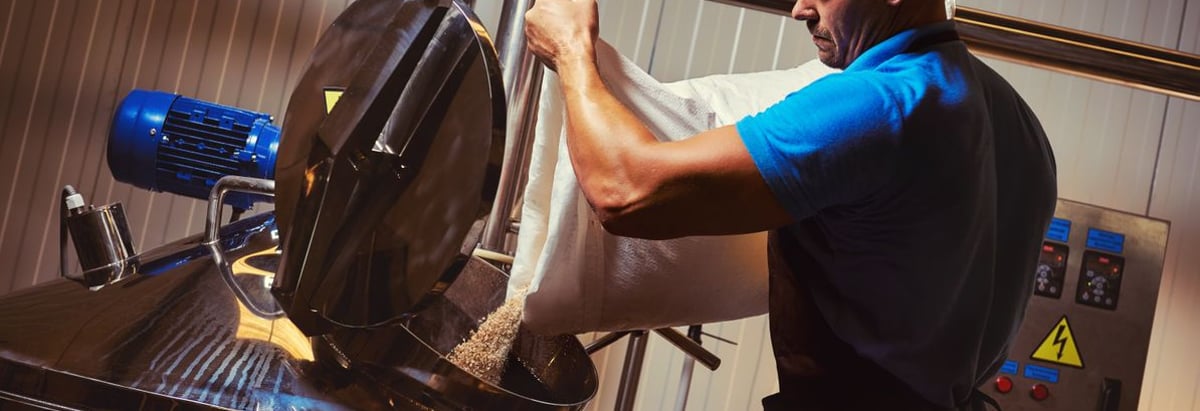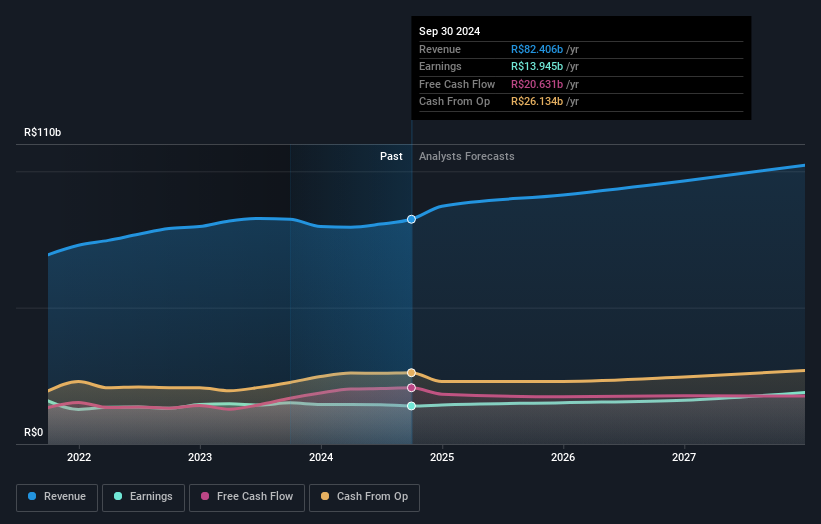Public companies who have a significant stake must be disappointed along with institutions after Ambev S.A.'s (BVMF:ABEV3) market cap dropped by R$7.1b

Key Insights
- Significant control over Ambev by public companies implies that the general public has more power to influence management and governance-related decisions
- 62% of the company is held by a single shareholder (Anheuser-Busch InBev SA/NV)
- Institutional ownership in Ambev is 26%
To get a sense of who is truly in control of Ambev S.A. (BVMF:ABEV3), it is important to understand the ownership structure of the business. And the group that holds the biggest piece of the pie are public companies with 62% ownership. In other words, the group stands to gain the most (or lose the most) from their investment into the company.
While institutions, who own 26% shares weren’t spared from last week’s R$7.1b market cap drop, public companies as a group suffered the maximum losses
In the chart below, we zoom in on the different ownership groups of Ambev.
Check out our latest analysis for Ambev

What Does The Institutional Ownership Tell Us About Ambev?
Many institutions measure their performance against an index that approximates the local market. So they usually pay more attention to companies that are included in major indices.
As you can see, institutional investors have a fair amount of stake in Ambev. This implies the analysts working for those institutions have looked at the stock and they like it. But just like anyone else, they could be wrong. It is not uncommon to see a big share price drop if two large institutional investors try to sell out of a stock at the same time. So it is worth checking the past earnings trajectory of Ambev, (below). Of course, keep in mind that there are other factors to consider, too.

We note that hedge funds don't have a meaningful investment in Ambev. The company's largest shareholder is Anheuser-Busch InBev SA/NV, with ownership of 62%. This essentially means that they have extensive influence, if not outright control, over the future of the corporation. Fundacao Antonio e Helena Zerrenner, Endowment Arm is the second largest shareholder owning 10% of common stock, and First Eagle Investment Management, LLC holds about 2.2% of the company stock.
While it makes sense to study institutional ownership data for a company, it also makes sense to study analyst sentiments to know which way the wind is blowing. There are plenty of analysts covering the stock, so it might be worth seeing what they are forecasting, too.
Insider Ownership Of Ambev
The definition of an insider can differ slightly between different countries, but members of the board of directors always count. Management ultimately answers to the board. However, it is not uncommon for managers to be executive board members, especially if they are a founder or the CEO.
Insider ownership is positive when it signals leadership are thinking like the true owners of the company. However, high insider ownership can also give immense power to a small group within the company. This can be negative in some circumstances.
We note our data does not show any board members holding shares, personally. Not all jurisdictions have the same rules around disclosing insider ownership, and it is possible we have missed something, here. So you can click here learn more about the CEO.
General Public Ownership
The general public-- including retail investors -- own 12% stake in the company, and hence can't easily be ignored. While this size of ownership may not be enough to sway a policy decision in their favour, they can still make a collective impact on company policies.
Public Company Ownership
Public companies currently own 62% of Ambev stock. This may be a strategic interest and the two companies may have related business interests. It could be that they have de-merged. This holding is probably worth investigating further.
Next Steps:
I find it very interesting to look at who exactly owns a company. But to truly gain insight, we need to consider other information, too. Be aware that Ambev is showing 1 warning sign in our investment analysis , you should know about...
If you are like me, you may want to think about whether this company will grow or shrink. Luckily, you can check this free report showing analyst forecasts for its future.
NB: Figures in this article are calculated using data from the last twelve months, which refer to the 12-month period ending on the last date of the month the financial statement is dated. This may not be consistent with full year annual report figures.
New: Manage All Your Stock Portfolios in One Place
We've created the ultimate portfolio companion for stock investors, and it's free.
• Connect an unlimited number of Portfolios and see your total in one currency
• Be alerted to new Warning Signs or Risks via email or mobile
• Track the Fair Value of your stocks
Have feedback on this article? Concerned about the content? Get in touch with us directly. Alternatively, email editorial-team (at) simplywallst.com.
This article by Simply Wall St is general in nature. We provide commentary based on historical data and analyst forecasts only using an unbiased methodology and our articles are not intended to be financial advice. It does not constitute a recommendation to buy or sell any stock, and does not take account of your objectives, or your financial situation. We aim to bring you long-term focused analysis driven by fundamental data. Note that our analysis may not factor in the latest price-sensitive company announcements or qualitative material. Simply Wall St has no position in any stocks mentioned.
About BOVESPA:ABEV3
Ambev
Through its subsidiaries, engages in the production, distribution, and sale of beer, draft beer, carbonated soft drinks, malt and food, other alcoholic beverages, and non-alcoholic and non-carbonated products in Brazil, Central America and Caribbean, Latin America South, and Canada.
Flawless balance sheet second-rate dividend payer.
Similar Companies
Market Insights
Community Narratives



